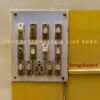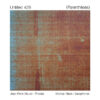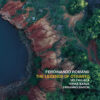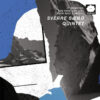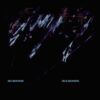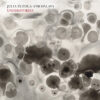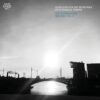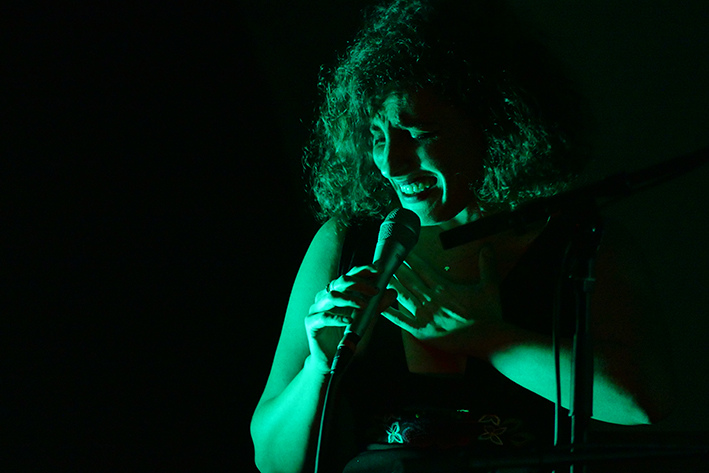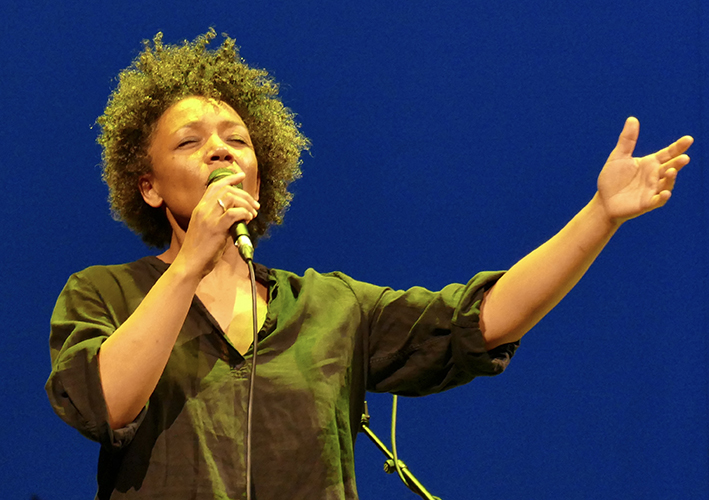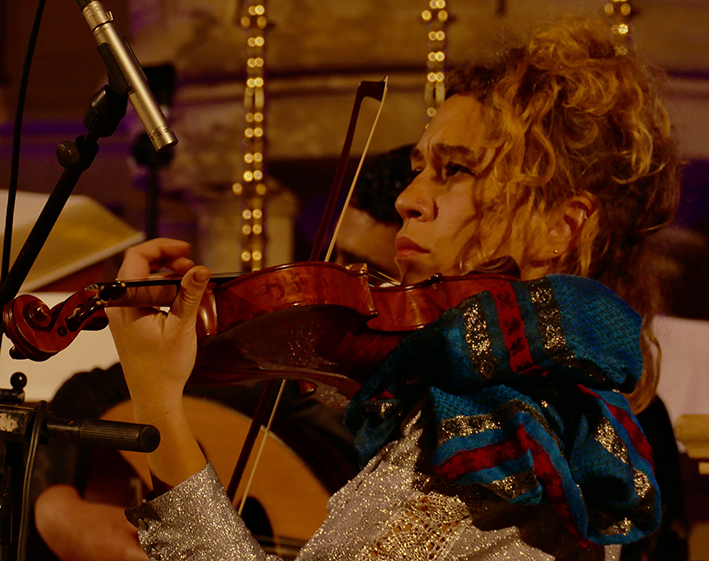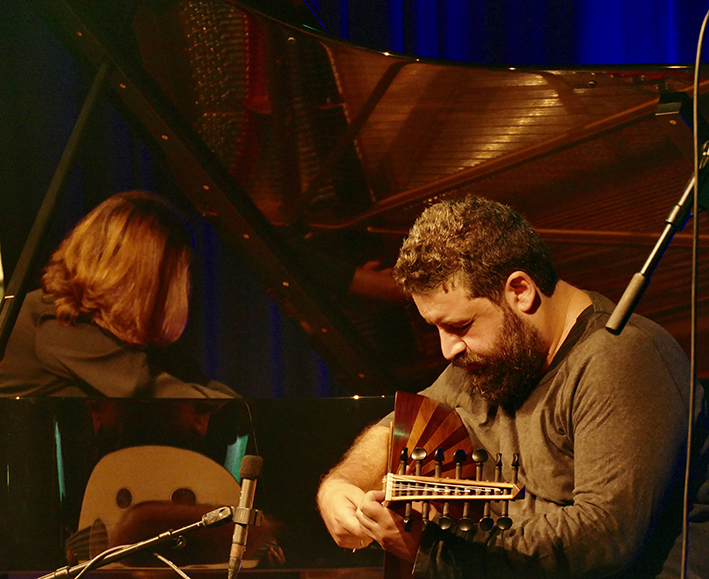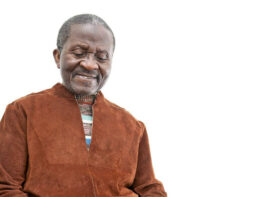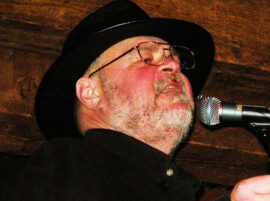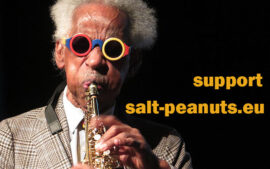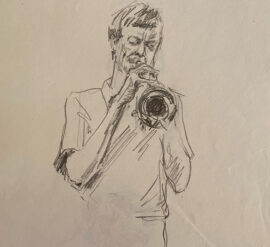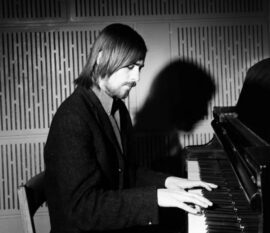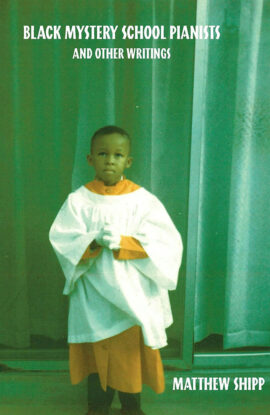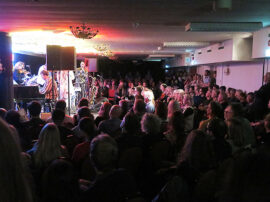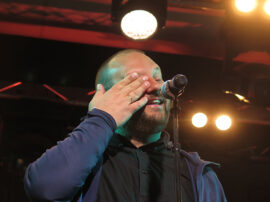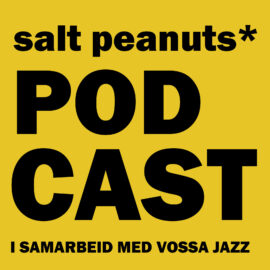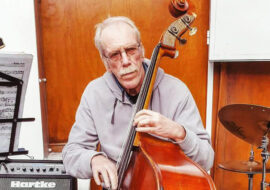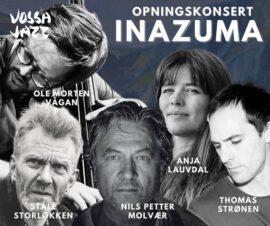ENJOY JAZZ, GERMANY, OCTOBER 01. – NOVEMBER 14. 2021: Enjoy Jazz is seven-week festival taking place in October/November in the urban conglomerate of Heidelberg, Mannheim and Ludwigshafen on the banks of Rhine and Neckar. While Heidelberg and Mannheim situated on the right bank are part of federal state Baden Württemberg, Ludwigshafen on the left bank of the Rhine is part of the federal state of Rhineland-Palatinate. More about the festival, its organization, its socio-political and socio-cultural themes and musical foci later. Here first a review of concerts attended from October 11 – 18, 2021.
Black Sea Songs
I arrived in the second festival week that started on the outskirts of Heidelberg on a mountain top of the Neckar valley in the monastery church of Stift Neuburg. The location turned out as an ideal place to carry and amplify the inner potentials of the three musicians, vocalist Sanem Kalfa (main picture) and violinist/guitarist George Dumitriu from Amsterdam and reedist Joachim Badenhorst from Antwerp, when they performed their futuristic echoes of old songs from the shores of the Black Sea: songs from Turkey, from Georgia, from Ukraine, Romania and Bulgaria, songs of a variety of ethnic groups inhabiting that area, songs that were released on an album recently by El Negocito Recordings.
Kalfa and Dumitriu who share a long time of artistic development, lately have grown together with Badenhorst as wild card into a greatly fitting creative unit. They conjured the magics of the variate Black Sea’s cultural landscape by ‘singing the space’ of the Heidelberg monastery church. Thereby they let those songs emerge from the air, got them to unfold and take shape, fan them out and let them fade out into wider spaces by their joint forceful and delicate musical gestures.
This kind of ‘open’ approach enables the unit of musicians to achieve a high quality of emergence from the actual space-time continuum and a continual extension and progressive shaping of their musical sources. La Kalfa is a true, daring performing force of full bodily, ardent and soulful expression intensity. As an active bending and extending force she playfully creates a bond with their audiences feeling layers. With extraordinary sensuality she stages her ‘persona performativa’ and enlivens the songs as own creatures or spirits roaming through imaginary landscapes.
These musicians are characters that are not afraid of taking up the challenge of emerging rough sides instead of smoothing the music out. They make use of extended/experimental techniques but never in a detached or freaking-out manner but by focusing on the song’s inner nature, own potentials and character. It was a fine and strong concert in all relevant dimensions presented at a great location by a collaboration of KulturTandem International of Cristina Nan and Enjoy Jazz.
Into the dark
Next evening brought me to Ilvesheim, a small town at the eastern periphery of Mannheim. The concert took place in the meeting hall of school for blind people and accordingly the concerts there happen in complete darkness for ALL visitors. Due to Covid-restrictions this year’s edition was a little less consistent: visitors could not be guided by a blind person to the seat in a completely darkened room. But when the concert started it was almost completely dark until the end. Also the musicians of the group of four musicians with the significant name Beyond Borders had to play in almost complete darkness. It was a surprising experience in manyfold sense. First, the instrument’s sound is less ‘fixed’, less delineated mentally. The space around is deeper, instrument’s sounds are more perceived as ‘sound ghosts’ – being closer by and at the same time elusive. This fascinating sensation continued through the whole concert. It would have been a still greater special sensation when the audience, at the end when the lights came on, would have been confronted with an empty stage.
Second, the leading ‘sound ghost’ was the oud of Fadhel Boubaker, which gave the music a special new color and feeling immediately. Third, the group came along with Beatles songs, starting with the George Harrison’s love song ‘Something’ 1968. It became clear that these songs – due to their great melodies – were fully compatible with the Arabic approach or already were impregnated with Arabic tonalities. Fadhel Boubaker together with his fellow musicians, saxophonist Niko Seibold, electric bassist Jonathan Sell and drummer Dominik Fürstberger made it a real feast, celebrating those wonderful pop songs In ‘extended’ versions. Boubaker is a remarkable versatile and winning Mannheim musician. I met him first in a blind date I was involved in last year’s Enjoy Jazz program.
It is always a special pleasure to listen to him and see him play. This time his playing in this context triggered the memory of Peter Green’s guitar playing and some of Green’s compositions, especially “Black Magic Woman” and “Albatross”. Both would have fitted wonderfully in this program. Also the Neapolitan song “Oh Sole Mio” would have fitted in as a great bridge. The music fully hit the nerve-spot of the audience leading to great enthusiasm and three encores.
Angel Bat Dawid
I was looking forward to the concert of Angel Bat Dawid – together with Makaya McCraven, Moor Mother & Irreversible Entanglement and Jaimie Branch – representing the young furore label International Anthem from Chicago, the other rough and raw side of present jazz. I have my doubts about her music making and the way lots festivals presenting her. So this would have been a prime occasion for a first-hand experience. It wasn’t supposed to be. Due to a non-valid passport the musician couldn’t reach Heidelberg and the concert had to be cancelled on the day of the concert.
Jazzday Reloaded
The Jazzday Reloaded concert next day in a former Wool Manufacture in Schwetzingen, another town participating in the festival, was a different kettle of fish. Here a colorful eight-piece ensemble of musicians, all from the region, made its appearance playing in a series of different break-ups: guitarist Claus Boesser Ferrari, saxophonist Alexandra Lehmler, drummer Erwin Ditzner, saxophonist Lömsch Lehmann, pianist Apollonio Maeillo, vocalist Jutta Glaser, bassist TC Debus and (yes, again) oud player Fadhel Boubaker, musicians that played in various constellations in other parts of the festival too.
The same ensemble had caused a stir with its streamed contribution to this year’s Jazz Day in April, a remarkably energizing and playful affair also due to a masterful real time image cut and direction. It called for a real live version in front of a home audience. Provided with inspiring visuals (by Jaimez Ramirez) and carried enthusiastically by the local audience, this ‘Mannheimschaft’ realized its earned reputation with the same playfulness and humor again. Relaxed and joyful this troupe rendered a splendid concert with lots of fine and funny finds.
The place Schwetzingen with its beautiful Rococo castle and gardens has its own Jazz Days that are integral part of Enjoy Jazz now. Significantly at a later October date one of the legendary ensembles from the area, the United Jazz + Rock Ensemble would perform there in a 2nd Generation line-up. The original UJRE comprised musicians as Wolfgang Dauner, Eberhard Weber, Albert Mangelsdorff, Christof Lauer (all from the area), Charlie Mariano, Kenny Wheeler, Barbara Thomson, Jon Hiseman, Ian Carr.
Giannouli Trio
Friday , October 14, the festival continued with the trio of pianist Tanya Giannouli from Athens known for its unique line-up of piano, oud (Kyriakos Tapakis) and trumpet (Andreas Polyzogopoulos) at the venue Das Haus in Ludwigshafen that regularly participates in the festival and provides strong series of concerts. This year Yussef Dayes Trio, SWR Jazz Award (Eva Klesse), Matthew Halsall, Joey Alexander Trio, Moor Mother + Irreversible Entanglements, Jaimie Branch and Craig Taborn.
It was Giannouli’s third appearance at this venue in a row and her fourth time at the festival. 2019 she made her overwhelming debut in duo with Maori-musician Rob Thorne from New Zealand, a concert that stuck to the audience of Enjoy Jazz as its favorite concert. 2020 she returned with her 5-piece unit Book of Lost Songs (Maria Pia de Vito (voc), Michele Rabbia (perc), Guido De Flaviis (sax), Manolis Manousakis (electronics). A few days later she did a magnificent solo-recital at the Kunsthalle Mannheim. In 2021 Giannouli had been nominated for the German Jazz Award in the category ‘piano international’ together with Tigran Hamasyan and Shae Maestro.
This trio was in a way a counterpart to the first trio reviewed here. There was no bending, stretching or meandering along bare and rich spots of the riverbed. It’s just different approaches of absorbing and shaping musical sources, both valid and with their own specific merits. Giannouli solely relies on her own compositions moving through centrifugal expansion, haunting accelerative runs, expectative ostinatos, labyrinthine wanderings, and lingering melancholy – all emerging from a strong basis of sophisticated rhythmic-melodic entanglement, of a wondrous unity of dynamic flow, chiaroscuro, oscillating colorings and moods that constitute her captivating themes.
Sphinx-like enthroned at the piano, Giannouli kindled these movements and enthralling dynamics in pieces of the trio’s latest album “In Fading Light” to unfold them from the depth and let them flourish in full force and light together with her fellow musicians Kyriakos Tapakis on oud and Andreas Polyzogopoulos on trumpet and flugelhorn. The dynamics of the trio’s hypnotizing sound spread in full radiance and hit the audience with a poignant cathartic effect, a splendid concert! It turned out as a different side of Giannouli’s rich and variated musical gifts.
What makes the sounds of the oud so enthralling, especially if it is played by such a master as Tapakis in this ‘new’ context? The oud combines depths and lightness, bulbousness and rawness, sharpness. It’s a quite centering instrument that can sing too.
Tapakis knew when to do what on his instrument during this convincing concert, especially with its bass function, and … he played a striking and very touching solo. This also goes up for the first trio where Joachim Badenhorst played a gorgeous solo. Both were not showy, but integral in-depths solo parts.
The Music
The previous chapters already opened the view on a vivid and variated regional scene in this southwestern part of Germany. The next chapters deepen the insight with respect to current poly-cultural influences and elaborations and with respect to a strong historical impact of the region on the shapes of jazz.
OMM ensemble
The late night show of the 16-piece ensemble of the Oriental Music Academy of Mannheim (founded in 2008) with Turkish, Romanian, Polish, Tunisian and Indian musicians that took place at illustrious and sparkling Christuskirche (Christ Church) in Mannheim was the most colorful, distinctive, surprising and enchanting event during my one-week stay at Enjoy Jazz. The more than 2-hour performance that brought together Turkish, Arabic and Indian musical culture and traditions on the foil of Western polyphony and counterpoint exceeded all expectations concerning the musical level and range as well as its consistency and dramaturgic structuring. That indicated that it came forth from a deeper and wider spreading network in the region.
It was a quite special experience to see such a big group of passionate and capable musicians creating a new kind of music in a cumulative format. The only musician I actually knew was bustling oud-player Fadhel Boubaker, who is of Tunisian origin. I saw him during my one-week stay three times. The other musicians had to deploy themselves and make their mark. And they all did that as the ensemble’s sound unfolded with indulgence. There was stunning violinist and vocalist Güldeste Mamaç, a powerful woman taking her role with a wild determination and energy. There were the two versatile and driving percussionists, Tayfun Ates originating from Romania and Kasia Kadłubowska from Poland. There was Kenan Tülek’s stunning finger tapping on the Bağlama and his great interplay with Mehmet Ungan’s Bağlama and Rebab. After a while kanunista Muhittin Kemal and singer Serap Giritli joined and enriched the ensemble’s sound. Giritli’s radiant appearance gave the ensemble extra appeal and strength.
Mehmet Ungan, founder of the Academy, directed the ensemble, from the edge of the back row playing oud and new joined by the ouds of Abdelhade Deb and Fadhel Boubaker. Abdelhabe Deb also was the main vocalist in the first half of the concert. Deb and Boubaker were less visible but their presence could be felt and their contribution recognized clearly.
The most spectacular eye-catching part would take place in the second half: the South Indian Temple Dance (Bharata Natyam), performed by dancer Shany Sara Mathew and, performed by Talib Elmasulu, the Spinning Dance from the Sufi tradition, a meditation form performed within the Sema, the worship ceremony (also called whirling dervishes). Both were performed on the music of the musicians’ ensemble as an inspirative secular version.
Both dances forms have their own inventory and specific ways to derive from and speak to our senses, soul and spirit. While the Spinning Dance builds on the sensations of lengthy rotational movement, Bharata Natyam builds on movements and changing postures, on the dialectics and dynamics of the inner and outer of ourselves. It generates amongst others intense sensations of tension and reliefs well as sensations of momentum (also one of the highest values in jazz). Even eye movements and gaze are integral part of the dance. Both dancers performed on a high level of inner freedom and discipline.
The whole evening in the colorful church space was full of breathing sound, gracious movement and inner swing. It was a luminous gala, exuberant, essential and ascending It made souls shine. It was proof of the important role beauty and creation play in and for our lives.
For a greater part the musicians involved are teachers at the Academy but the ensemble was more than just a teacher ensemble. Music and dance happened on a higher level.
Continuing grow and improvement is fostered by working structurally and continually with visiting teachers the results of which I could experience three years ago, 2018, in an extraordinary concert of legendary lyra-player Ross Daly from Crete and oud-player Yurdal Tokcan presented by the Academy and Enjoy Jazz.
Frau Sammer, Nola Dada and Eva Klesse
A young actress/songstress from Mannheim, an all-female Austrian post-pop and otherwise-post group, Frau Sammer, a songstress and professor from Mannheim with her band, a female drummer and professor from Hannover with her band, that was the musical personnel of the last two days of my stay at Enjoy Jazz Festival.
Time after time Enjoy Jazz confronts me with interesting unknown things or unusual approaches and combinations. The band Frau Sammer was nothing less than a refreshing revelation. Frau Sammer, a Graz-Mannheim connection, is Tala Al-Deen (voc), Antonia Manhartsberger and Theresa Höllerer (synth) and Charlotte Baar (el-b). As actress Tala Al-Deen is member of Nationaltheater Mannheim. Frau Sammer sounded fresh and sassy, passionate and cool, sophisticated and disarmingly simple.
The group’s work connected well with creative language and vocal work I saw at recent Saalfelden Jazz Festival in Austria. It’s a new way of dealing creatively with everyday language and everyday day events by integrating that in musical storytelling with a new kind of intelligent lyrics. It would be worthwhile to explore more examples of this approach in jazz, rock and pop. Names as Ayse Cansu Tanrikulu and Jelena Kuljic’ come to mind here.
Eva Klesse (1986, Werl) is an acclaimed drummer and bandleader from Leipzig having worked with her band on high level since 2013. Propelling, intense and filligree are key characteristics of her playing, a special balance of nuance, power and imagination. “Creatures & States” her latest album is a great blend of self reflection, humor and narrative mystification.
2018 she was appointed professor at Hochschule für Music-Theater-Medien in Hannover, Germany. She is one of the few exception at university level of jazz education in Germany. Another one is dancer/vocalist Fola Dada (1977, Stuttgart). In 2020 she was appointed professor for pop- and jazz singing at Hochschule für Musik-Darstellende Kunst in Mannheim. Dada participated on Sunday in a symposium on Intersectionality at Nationaltheater Mannheim (more on it in an extra chapter) and gave a short elegant and energizing performance with her young band.
Drummer Eva Klesse is this year’s awardee of the most prestigious German jazz award, the SWR jazz price. It is the oldest award In Germany and was ever initiated by famous jazz pope Joachim E. Behrendt (1922-2000), for 40 years head of the jazz department of public radio of the federal states Baden Württemberg and Rhineland Palatia, SWR, and most influential jazz organizer in Germany in the second half of 20th century. Eva Klesse is the 41st awardee succeeding Daniel Erdmann, Liz Kosack, Sebastian Gille and Christian Lillinger etc. in previous years. Meanwhile the award is surpassed by the much bigger new central German Jazz Award that started this year.
Core-component of the award ceremony is a concert of the awardee. While last year’s awardee, saxophonist Daniel Erdmann played a joyful duo with pianist Aki Takase, Klesse chose for a two-step procedure that sandwiched the handing over of the award: first playing a round with the cornerstone of her music-making, her quartet with bassist Stefan Schönegg, pianist Philip Frischkorn and saxophonist Evgeny Ring and then a boosted round with her group together with Austrian guitarist Wolfgang Muthspiel. It turned out a made-to-to measure combination of truly mutually reinforcing impact.
In the encore, a gorgeous new piece, “Hearts on Hold”, was premiered, a sophisticated, thoroughly shaped composition that deserves to be adapted for a real large ensemble to shine in even fuller splendor in the future.
Region’s impact on the shapes of jazz
Through among others the radio culture the region historically had a strong impact on the shapes of jazz. Enjoy Jazz is in November followed by NEWJazz Meeting of the SWR, this year in its 52nd edition and the renowned Donaueschingen Festival, this year celebrates its 100th edition. Through the long and strong presence of the US Army forces in the region, jazz had a longstanding impact early on after WW II. Pianist/vibraphonist Karl Berger, born in Heidelberg and musically socialized in this context by among others Don Ellis and Leo Wright. He later founded the influential Woodstock Creative Music Studio together with Ingrid Sertso and Ornette Coleman and worked with among others with Don Cherry, Dave Holland, Sam Rivers, Bill Laswell. Bassist Eberhard Weber is another name as well as pianist Wolfgang Dauner. And, last not least Manfred Eicher is also from the (most southern part of this) region at Lake Constance.
A multitude of US-American and European jazz musicians came to the SABA studio of Hans Georg Brunner-Schwer to record for the MPS label and later on at Bauer studio in Ludwigsburg in the early days of the ECM label.
Festival organization, socio-political and socio-cultural themes and musical foci
Jewish life (culture and music) in Germany, Intersectionality, Extreme Music, Drone and Groove Music, UK scene, Drums.
Text and photo: Henning Bolte

